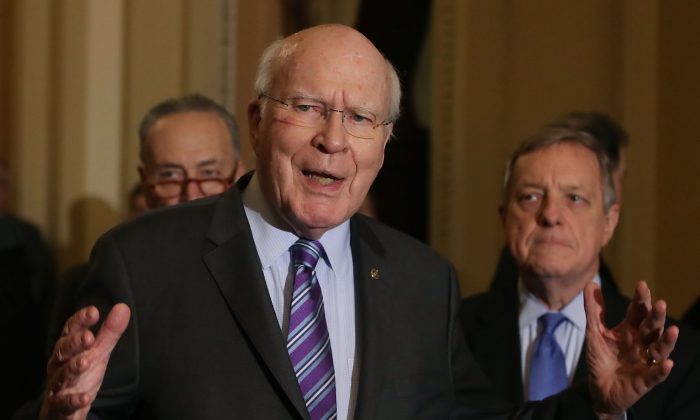
Sen. Patrick Leahy (D-Vt.), the current president pro tempore of the Senate and a prominent Democratic leader, has announced that he will retire in 2022, joining a growing list of Democratic retirees in the thinly-held House and Senate.
Leahy is currently the Senate’s most senior member, having first been elected in 1974 as a so-called “Watergate Baby” following the revelations surrounding the Watergate scandal under President Richard Nixon. revelations set off a chain of Republican losses in the 1974 midterms, allowing Leahy to begin his 48-year term in office.
Announcing his retirement in a speech on the floor of the Vermont State House, Leahy reflected on his original impetus to join the U.S. Senate.
“What propelled me was a belief that I understood the needs and values of Vermont and thought it was time for a new generation to address them,” Leahy said.
Leahy also said that Edmund Burke, a Dublin-born Whig who served in the English Parliament through much of the 18th century, acted as a “North Star” for him during his time in Congress. “[Burke] said, ‘Your representative owes you not his industry only, but his judgment,’” Leahy commented. “Burke also said that a representative ‘ought not sacrifice to you’ his ‘conscience.’”
Since the beginning of his career, Leahy has sometimes broken with the wishes of his constituents, following Burke’s advice. One such incident related by the senator involved the Vietnam War. “In Vermont … support for the war was strong,” Leahy said, adding, “I had always opposed it.”
After taking office, Congress was faced with a measure to reauthorize the Vietnam War. This measure, with Leahy’s no vote, was defeated by a single vote. “I was proud to be that vote,” the senator said.
Later, Leahy would join the Senate Agriculture Committee, and would eventually become the committee’s chairman. At some point during his career, Leahy used his influence to change the committee’s name and focus to the Agriculture, Nutrition, and Forestry Committee.
Leahy said that one of his major victories on the committee was the establishment of national standards for labeling a food product as “organic.” Leahy applauded that legislation for “helping to launch an organic farm sector that now is a $55 billion a year industry and an important new avenue for Vermont’s farmers.”
Summarizing his time on the committee, Leahy said: “Open land. Cleaner water. New markets for our farmers. Providing nutritious food for those in need. That will be a legacy to our state for generations.”
Leahy also would also eventually join the Senate Judiciary Committee, serving as the committee’s chair or ranking minority member for 20 years.
“My oath was to protect the Constitution and I fiercely defended our civil liberties, the First Amendment, our right to privacy and the free flow of information from the government to the people it represents,” Leahy said of his long work on that committee.
“Serving on the Judiciary Committee also meant being there at times of crisis such as the attacks on 9/11,” Leahy continued. “We not only had to protect our nation from outside threats, but from a zealous administration that advocated some of the most serious roll backs of basic civil liberties.”
However, Leahy did not vote against the so-called Patriot Act in the aftermath of the Sept. 11 attacks, a bill that would become controversial to many Americans who alleged that the bill violated basic liberties in the Bill of Rights.
Concluding his speech to Vermont lawmakers, Leahy said: “I will tell my fellow senators that I will not be on the ballot next year. I will not run for reelection.” He explained his decision to announce his retirement in the Vermont State House first, saying, “It is important to me to announce that here at home, just a few yards from where I grew up as a child in Montpelier.”
With his announcement, Leahy joins a growing list of Democrats announcing their plans to retire ahead of a tough midterm election season.
In the House, prominent Budget Committee chairman John Yarmuth (D-Ky.) has also announced his plan to retire in 2022. Reps. Mike Doyle (D-Pa.) and David Price (D-N.C.) also plan to retire at the end of their terms in 2022. Reps. Cheri Bustos (D-Ill.), Filemon Vela (D-Texas), Ron Kind (D-Wis.), and Ann Kirkpatrick (D-Ariz.) have announced the same intention.
Pezou : Sen. Leahy, Longest-Serving Senator, Not Running for Another Term